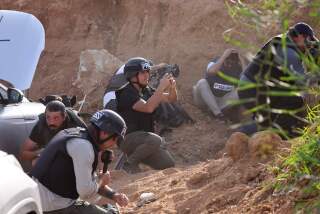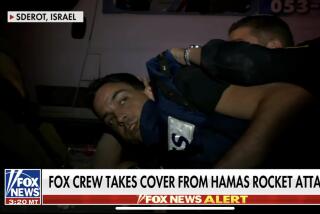TV Networks Prepare for War on Many Fronts
- Share via
NEW YORK — Television news operations are rapidly mobilizing to cover a war that is shaping up to be covert and fractured across many countries. At the same time, the American public’s expectations of being able to witness the hostilities are higher than ever after many watched the terrorist attacks as they happened.
ABC, CBS, CNN, Fox News Channel, NBC/MSNBC and a host of worldwide rival news organizations are working feverishly to be the best-positioned if major hostilities break out, applying for difficult-to-get visas, booking seats on flights with limited space and chartering planes in some cases. During the first 12 hours after the Sept. 11 attacks, many TV news organizations shared video, but that almost certainly won’t be the case during war, and having the best pictures is crucial in the highly competitive TV news business.
Just after 11 a.m. PDT Saturday, CNN began airing clear pictures from inside rebel-controlled territory in northern Afghanistan, thanks to a 1-ton satellite uplink facility it was able to get operational in the remote area. The pictures were a significant improvement over the jerky satellite videophone images CNN had been transmitting, not always reliably. Getting the uplink in position was an expensive process that meant transporting about 20 cases of gear from Moscow to Tajikistan by plane and then to a rebel base by helicopter and truck. And it’s dangerous, said Eason Jordan, CNN’s chief news executive, who said he has never known an uplink to be so close to the front in a ground war.
CNN’s high-stakes investment in the uplink and the three reporting teams it has sent to the region are an educated guess that any possible U.S. military action will be centered in nearby Taliban-controlled areas of Afghanistan, where suspected terrorist mastermind Osama bin Laden has been headquartered. But the terrorist activities that the U.S. is gearing up to attack are diffuse, and even President Bush warned Thursday in his televised address that not all actions would be seen on television.
“Our biggest problem is: Where is something going to happen and will it be something we can capture on camera?” said Marcy McGinnis, vice president, news coverage, for CBS News. “People are so used to being able to see pictures instantly. . . . We all watched the plane go into the building, and the expectations of viewers are: ‘If it happens, I’m going to see it.’ ”
It’s one thing for news organizations in New York to get live pictures of events there; “it’s another thing in the outback of Afghanistan,” said Jordan. “The president has conditioned the American people and prepared them not to see everything that’s going to happen, and we need to manage people’s expectations.”
Viewers, he said, tend to forget that the celebrated pictures of bombs falling on Baghdad in the Persian Gulf War, which put CNN on the map, weren’t on air for 24 hours after the war started; the first days’ reports were instead what he calls “radio,” or live accounts from reporters on the telephone.
Nonetheless, he said, “You will see more live TV versus live radio than we saw 10 years ago,” thanks to advances in technology, including the highly transportable videophones, which are proliferating at news networks.
“It’s not a perfect television picture, but certainly if it’s a dramatic enough picture, I think the viewing audience will accept the slightly herky-jerky quality,” said John Stack, vice president of news gathering at Fox News Channel.
But no news organization knows exactly what the U.S. military has planned.
“If we’re kept in the dark, we can only do what we can do,” McGinnis said.
So TV executives are trying to mobilize as many correspondents and crews to as many places as reasonable, given tight financial resources and the prospect that the war might last for months, not days.
“I can’t have Allen Pizzey in Islamabad for months or years,” McGinnis acknowledged. “But we don’t know what we’re dealing with yet and we can’t make decisions until we know.”
At least initially, no one can afford to lose out, although the levels of mobilization vary widely. CNN said it has about 75 people in 17 non-U.S. locations focused exclusively on the terror attack story and its aftermath, everywhere from Sudan to Yemen. Its correspondent in Taliban-controlled Afghanistan was expelled last week, but Jordan said CNN has other local people on site.
CNN still wants “to be everywhere there is action,” he said. “We may or may not be able to achieve that, but certainly the more chips you put on the table, the better the odds are.”
CBS has about 30 people in the region, including three reporters in Pakistan, where many news organizations have congregated, and one in Tajikistan, on Afghanistan’s northern border. CBS has moved people into six places in the region; NBC News said it now has more than 50 people in seven or eight places it isn’t normally stationed. ABC News didn’t comment. Even before there was official assertion of a connection to Osama bin Laden, Fox News had a Paris-based correspondent and videophone on the way to Islamabad within hours of the World Trade Center attack.
As TV crews try to anticipate their own technological needs at the staging areas, radio news reporters admit they have benefited significantly in recent years from light, less expensive and higher quality transmitters. In the last two years, digital compression technology has become so reliable that several Associated Press staffers, who deliver reports for AP TV, AP Radio as well as AP print, are carrying Comrex Hotlines around Pakistan.
“It digitizes the voice and sends it in a stream along the phone line,” said Brad Kalbfeld, deputy director and managing editor for AP Television and Radio. “It just sounds clearer.”
About 500 U.S. radio stations use AP Radio, and AOL streams the pieces over their Web site.
But network news radio executives are concerned with the sterile, restricted atmosphere in which their foreign correspondents will be forced to file pieces.
“The Pentagon is going to give us their daily briefings, and we won’t have much of a chance to question what they’re telling us,” said Loren Jenkins, senior foreign editor for National Public Radio, a member-supported network that reaches 600 FM stations across the country. “This war will be hard to cover because we won’t be able to check civilian causalities. The borders have been sealed. [But] good war reporting depends on being able to double-check what the official versions are.”
Chris Berry, vice president of ABC News Radio, agreed, and said that while television crews and photographers can get distant images, radio reporters--like print reporters--need to speak to their subjects face to face. ABC set up a bureau in Islamabad, and the time difference has worked to correspondents’ advantage because when evening falls there, American motorists are heading to work.
“Morning is a very important time of day for radio stations,” Berry said, adding that 4,500 FM and AM stations in the United States use ABC radio product. On Friday, ABC got visas for reporters in Bahrain. They’ll also send someone to Bari, Italy, a typical staging area for NATO forces.
When NPR’s Jenkins rapidly described the network’s coverage plans, it began to sound like a game of human chess. The network’s South Asian correspondent, Michael Sullivan, and the Beijing correspondent, Rob Gifford, have been in Islamabad since last week.
“And we’re bringing in one from our Tokyo bureau. We’ve sent one correspondent to Uzbekistan. We have another correspondent on his way to Tajikistan. We’re about to move our Rome correspondent to Turkey. Our Beirut correspondent may get a visa to Iran,” Jenkins said.
The AP has dozens of people in Pakistan, including writers, photographers and producers, all of whom contribute radio pieces. But they are very aware of the problems facing every medium--the unique characteristics of this war.
“It’s not like we’re flying one or two people and trying to focus on one or two areas,” Kalbfeld said. “It will be geographically dispersed, and it sounds from the Bush administration like it won’t be a war where there clearly is territory to conquer.”
*
Jensen reported from New York, Calvo from Los Angeles.
More to Read
The biggest entertainment stories
Get our big stories about Hollywood, film, television, music, arts, culture and more right in your inbox as soon as they publish.
You may occasionally receive promotional content from the Los Angeles Times.










